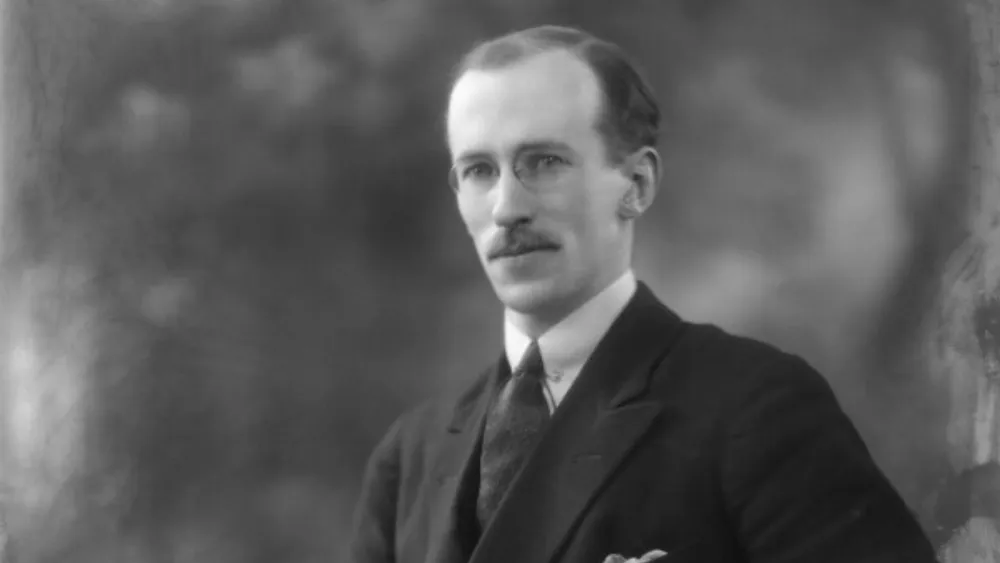Sir Basil Liddell Hart, known as Captain B. H. Liddell Hart, was a British soldier, military historian, and theorist (1895-1970). He advocated an “indirect approach” in warfare, cautioning against costly frontal assaults as seen in World War I. His prolific writings influenced military strategy and were believed to shape German World War II tactics. However, accusations arose that he pushed captured German generals to overstate his involvement in blitzkrieg development. Liddell Hart also played a role in promoting the “Rommel myth” and the idea of a “clean Wehrmacht” post-World War II. His impact extended beyond the battlefield, making him a controversial figure in military history.
From Trench Warfare to Revolutionary Ideas
Basil Henry Liddell Hart was born in Paris, the son of a British army officer. His father’s military background undoubtedly played a role in shaping young Basil’s future. The stories and experiences shared by his father instilled in him a deep respect for the military, its history, and its evolving strategies.
These early influences and his natural curiosity set the stage for his lifelong exploration of the art of war.
Liddell Hart’s passion for military history and strategy found fertile ground at Cambridge University. He immersed himself in studying classical military campaigns and the writings of renowned strategists.
His time at the university gave him the academic foundation upon which he would later build his groundbreaking ideas.
However, the cataclysmic events of 1914 would thrust Liddell Hart into the crucible of war and shape his thinking profoundly. When World War I erupted, he felt compelled to serve his country. He enlisted in the British Army and became an officer in the Somerset Light Infantry. Therefore, he found himself on the harrowing battlefields of the Western Front.
Game-Changing ‘Indirect Approach’ to Warfare
One of Liddell Hart’s most enduring contributions to military theory is his concept of the “indirect approach.” He argued that military objectives could often be achieved more effectively by avoiding a confrontation with the enemy and instead focusing on disrupting the enemy’s plans, logistics, and morale.
This concept laid the groundwork for a more flexible and nuanced approach to warfare, emphasizing maneuver, surprise, and the psychological aspects of combat.
His experiences in World War I shaped Liddell Hart’s thoughts on the indirect approach. He observed that the trench warfare tactics employed at the time were highly costly regarding lives and resources and often led to stalemates. He believed a more flexible, less attrition-based strategy could achieve better results.
Basil Lidell Hart and His Influence on Military Thinkers
Liddell Hart’s ideas on warfare gained prominence in the interwar period, particularly through his writings. His books, “The Decisive Wars of History” and “Strategy,” garnered international attention. Moreover, it established him as a leading military strategist.
He also corresponded with and influenced a generation of military leaders, including prominent figures like Dwight D. Eisenhower and Heinz Guderian.
Perhaps one of the most influential beneficiaries of Liddell Hart’s teachings was the German General Erwin Rommel, known as the “Desert Fox.” Liddell Hart’s writings on the indirect approach heavily influenced Rommel’s innovative and mobile tactics during World War II, which allowed him to achieve numerous successes.
Controversy Surrounding the Military Theories of Basil Lidell Hart
Despite his significant contributions, Liddell Hart was not without his critics. Some accused him of advocating overly cautious and passive strategies. These critics believed that this strategy could be detrimental in certain situations.
Critics argued that his ideas, particularly the concept of the “indirect approach,” were not universally applicable. Furthermore, they thought the approach might lead to strategic indecision or missed opportunities.
Liddell Hart’s influence on British military doctrine was also controversial. Some claimed that his ideas hindered the British Army’s preparedness for World War II by promoting a defensive mindset that did not align with the demands of modern warfare.
Relevance in the Complex Landscape of 21st-Century Warfare
Liddell Hart’s legacy endures in contemporary military thought, serving as a timeless source of wisdom for military professionals and strategists. His emphasis on flexibility and mobility remains highly relevant in the complex and dynamic military landscape of the 21st century. As modern conflicts often blur the lines between conventional and irregular warfare, Liddell’s insights have become even more critical.
Military academies and defense institutions worldwide continue to incorporate his teachings into their curricula, recognizing the enduring value of his ideas.
The study of his works is not just an academic exercise; it’s a practical necessity for those responsible for national defense as they seek to navigate the intricacies of asymmetric warfare, counterinsurgency, and the ever-evolving nature of conflict.
Liddell Hart’s concept of the “indirect approach” has transcended the confines of military strategy. Its principles of maneuver, deception, and psychological influence have found application in various domains, including business and politics.

A Bridge between Traditions and Progress
Sir Basil Liddell Hart’s resilient spirit and strategic genius continue to mold military thought and leave a lasting impression on the art of war. His life’s work represents a bridge between the past and the future, challenging conventional wisdom and propelling the evolution of military thought.
Liddell Hart’s commitment to rethinking traditional military doctrines, advocating for adaptability, and promoting a more intelligent approach to conflict has reshaped how wars are fought and won. His ideas, which once faced criticism and debate, have withstood the test of time, emerging stronger and more relevant than ever.
Timeless Legacy of Basil Liddell Hart
As we confront the complexities and uncertainties of the 21st century, Liddell Hart’s legacy stands as a guiding beacon. He reminds us that the lessons of history and the innovative thinking of a single visionary can revolutionize the very nature of warfare.
His influence inspires military leaders, scholars, and thinkers. Making sure that his legacy will live on for future generations. He did it by imparting timeless knowledge to those who wish to comprehend, adapt to, and master the art of war.












Some genuinely interesting points you have written.